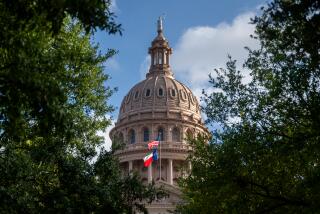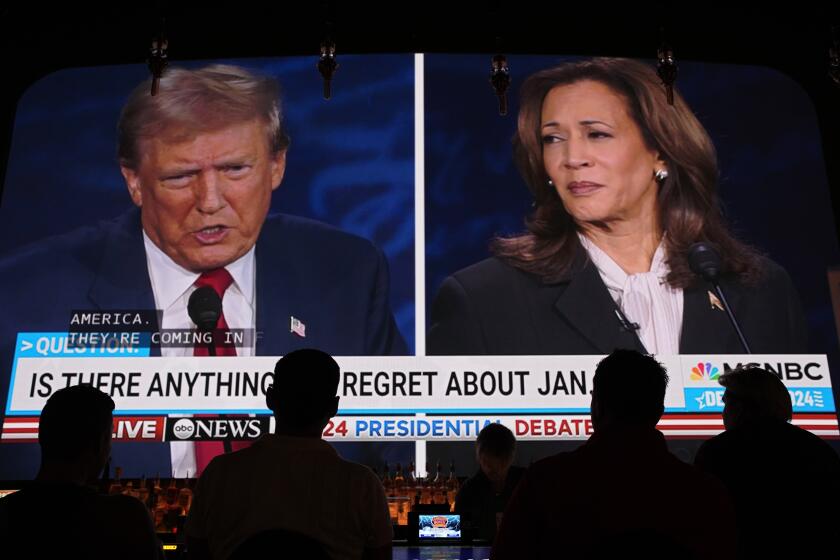Early Balloting Means Early Problems
A record wave of early voting promises to cut crowding on election day, but the trend has also front-loaded this year’s election with problems -- long lines at early-voting stations, missing absentee ballots and controversy over retooled rules for early balloting.
Analysts and opinion surveys project that more than 26 million of an estimated 120 million voters might cast their ballots before the traditional start of polling -- at midnight on election eve in Dixville Notch, N.H.
Despite hopes that early voting would reduce anxiety after a highly contentious 2000 election, a recent survey found that 40% of Americans believe that most of the problems exposed in that election have not been corrected. And nearly half of Americans in another survey said they think this year’s results will be challenged in court.
Many local election officials share those fears. Already overtaxed by voting that now lasts for weeks, some doubt that their work will be finished Tuesday.
“It will not be over on Nov. 2, and you can put that on the record,” said Susan Miller, elections director for Colorado’s Jefferson County. “We have 12 days to certify provisional ballots. In Colorado, there is more than likely to be a recount.”
Miller says she has already been told about four or five groups that might file lawsuits to challenge results in her county, which includes the town of Golden. She worries that “another Florida” -- with its 36-day recount and disputed ballots -- could become a self-fulfilling prophecy.
“We’ve been working six-day weeks, 12-, 14-hour days for a month,” Miller said. “When the public calls and says they don’t trust us, it breaks my heart.... We’re at the point where we don’t care who wins. We just want him to win by a landslide. Then we don’t have to recount the ballots.”
The Washington-based Committee for the Study of the American Electorate has projected turnout as high as 60% this year (compared with 54% in 2000), which would mean voting by more than 120 million Americans. Twenty-two percent of them, or more than 26 million, planned to cast votes before Tuesday, according to the National Annenberg Election Survey.
That trend has been evident across the country, in states where the presidential election is close and where it is not, such as California.
In Palm Beach County, Fla., requests for absentee ballots have more than doubled, and retirees and others have waited as long as two hours in line at satellite voting stations. Iowa has seen a nearly 55% jump in absentee ballot requests. New Mexico’s secretary of state expects half of her votes to be cast before Tuesday. The number of residents on the Hawaiian island of Oahu asking for mail-in ballots has spiked by nearly 82%.
In California, an enormous jump in absentees has been led by Orange County, with an increase of 200,000 to about 450,000. Los Angeles County has seen a more modest 18% increase, to 740,000, said Conny McCormack, the county’s registrar-recorder.
Officials nationwide say the deluge of early voting has them in effect running two elections -- requiring extra staffing and long shifts to handle absentees and then a second push to prepare election day polling places.
“It’s time-consuming and tiring,” McCormack said.
Most of those voting by mail will avoid such a crunch and should have their ballots counted without glitches, experts said. But there already have been some trouble spots.
In Broward County, north of Miami, officials have been deluged with hundreds of complaints from voters who say they never received their absentee ballots. U.S. Postal Service investigators were trying to find an undetermined number of the 60,000 ballots the county mailed out Oct. 7 and 8.
“That is something beyond our control,” said the county’s deputy supervisor of elections, Gisela Salas. “We really have no idea what’s going on.” Salas advised voters who did not receive their ballots to go to the county’s early-voting stations.
But Florida’s voting stations -- at libraries, city halls and other civic buildings -- have not necessarily made balloting easier.
In Del Rey Beach, Judy Sternberg nearly fainted after a two-hour wait in the sun. Paramedics came to her aid, but Sternberg, 69, was not about to go home.
“They really wanted me to come back a day later,” said Sternberg, who voted for President Bush. “I said, ‘I am not coming back. I am voting.’ ”
Attempts to clarify rules since the 2000 election have not eliminated disputes, particularly over how mail-in ballots should be treated. One of the most emotional and politically charged disagreements has been over military ballots from overseas.
Republican Sen. Rick Santorum of Pennsylvania has been pressuring Democratic Gov. Ed Rendell to accept ballots from military personnel up to 15 days after the election.
Rendell has declined, saying he had already attended to the issue by making special accommodations for two counties, Venango and Huntingdon, which have presented evidence that military personnel got their ballots late. Those service members got new absentee ballots by express mail, with prepaid express mail envelopes in which to send their completed ballots back.
A federal judge last week backed Rendell, saying that overseas military voters should cast their ballots by Tuesday.
But other states, including Arkansas, Colorado and Florida -- will allow absentee ballots from overseas to arrive at elections offices as much as 10 days after the election, as long as they were postmarked by Tuesday.
Another group that has complained about access to absentee ballots is college students. Although well over half of collegians this year plan to vote absentee, according to a Harvard University study, six states have laws that can make that difficult. In Louisiana, Tennessee, Michigan, Illinois, Nevada and West Virginia, voters must cast their first ballot in person, according to election watchers at Rock the Vote.
That means young people from those states who attend out-of-state universities may not get to vote, said Hans Riemer, Washington director for Rock the Vote.
“This is really made to disenfranchise college students,” Riemer said.
An additional concern could be presented to students in New Hampshire, who are warned on the secretary of state’s website that establishing their residence in the Granite State could affect insurance and some types of financial aid.
“This is a totally outrageous, preposterous, outlandish intimidation of young people,” Riemer said of state restrictions that affect students.
Not surprisingly, supporters of both Bush and Sen. John F. Kerry have claimed their side is getting the best of the early voting.
In most jurisdictions it is impossible to tell who is right. But a few states record the party affiliation of those voting absentee or at early voting locations.
In Polk County, the most populous in hard-fought Iowa, Democrats had a nearly 2-to-1 edge in early ballots cast -- 32,924 to 17,340.
In Los Angeles, McCormack was crossing her fingers that voters were prepared for a long ballot, jammed with state propositions. If not, she predicted, “it could be really ugly.”
Gary Smith, the Forsyth County, Ga., director of elections, said many of his colleagues had taken to reciting what he called the “night-before prayer”:
“Dear God, don’t let this election be close.”
More to Read
Get the L.A. Times Politics newsletter
Deeply reported insights into legislation, politics and policy from Sacramento, Washington and beyond. In your inbox three times per week.
You may occasionally receive promotional content from the Los Angeles Times.











